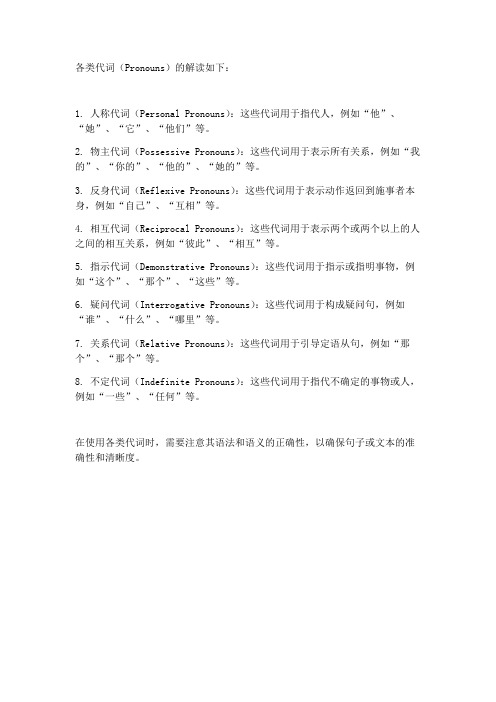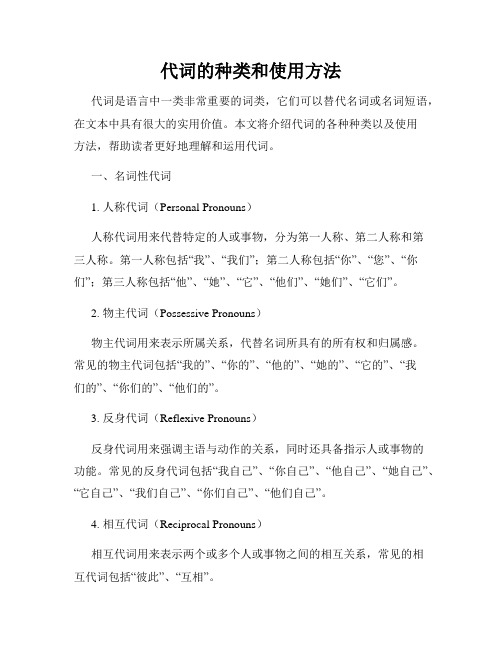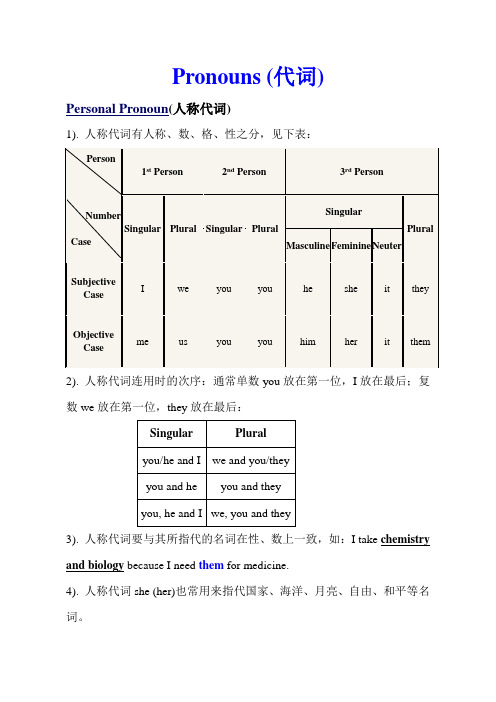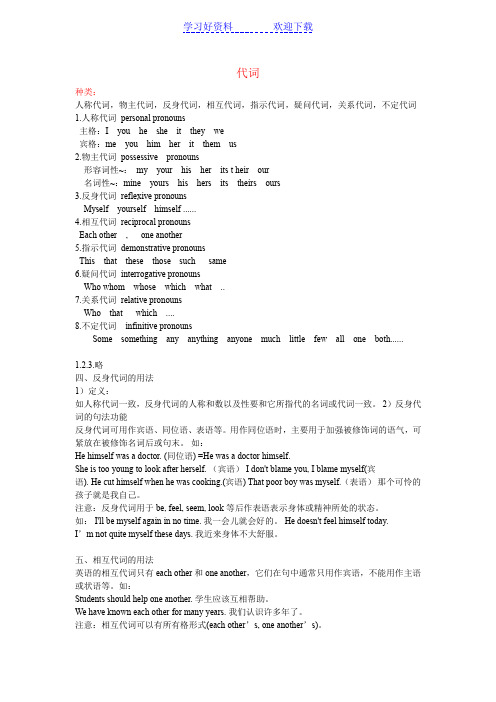4 pronouns
各类pronouns解读

各类代词(Pronouns)的解读如下:
1. 人称代词(Personal Pronouns):这些代词用于指代人,例如“他”、“她”、“它”、“他们”等。
2. 物主代词(Possessive Pronouns):这些代词用于表示所有关系,例如“我的”、“你的”、“他的”、“她的”等。
3. 反身代词(Reflexive Pronouns):这些代词用于表示动作返回到施事者本身,例如“自己”、“互相”等。
4. 相互代词(Reciprocal Pronouns):这些代词用于表示两个或两个以上的人之间的相互关系,例如“彼此”、“相互”等。
5. 指示代词(Demonstrative Pronouns):这些代词用于指示或指明事物,例如“这个”、“那个”、“这些”等。
6. 疑问代词(Interrogative Pronouns):这些代词用于构成疑问句,例如“谁”、“什么”、“哪里”等。
7. 关系代词(Relative Pronouns):这些代词用于引导定语从句,例如“那个”、“那个”等。
8. 不定代词(Indefinite Pronouns):这些代词用于指代不确定的事物或人,例如“一些”、“任何”等。
在使用各类代词时,需要注意其语法和语义的正确性,以确保句子或文本的准确性和清晰度。
四年级下册英语单词句子

四年级下册英语单词句子一、引言英语是全球通用语言之一,掌握好英语对学生未来的发展具有重要意义。
四年级是学生奠定英语基础的重要阶段,因此,理解和掌握四年级下册的英语单词和句子是非常重要的。
本文将详细介绍四年级下册的英语单词和句子,并附有例句和解释,以帮助学生更好地理解和记忆。
二、单词部分1. 名词(Nouns): 描述事物或人物的词,如动物、食物、颜色、学校设施等。
单词例句:dog、apple、chair、schoolbag等。
2. 动词(Verbs): 描述动作或状态的词。
单词例句:eat、play、read、write等。
3. 形容词(Adjectives): 描述事物或人的性质或特征的词。
单词例句:happy、beautiful、smart、kind等。
4. 代词(Pronouns): 代替其他词的词。
单词例句:I、you、he/she/it、we/they等。
5. 副词(Adverbs): 描述动词、形容词等的程度、频率或位置的词。
单词例句:always、often、usually、sometimes等。
三、句子部分1. 简单句(Simple Sentences): 由一个主语和一个谓语组成的句子。
例句:The dog eats breakfast every day.(主语+及物动词)2. 并列句(Complex Sentences): 由两个或多个简单句组成的句子,用并列连词(如and、but等)连接。
例句:I like dogs and I usually play with them in the park.(两个简单句)3. 从句(Subordinate Clauses): 句子的一部分包含另一个句子,这个被包含的句子叫做从句。
通常由从属连词(如what、where、when等)引导。
例句:What I like most about dogs is their loyalty and companionship.(主句+从句)四、单词和句子的应用为了让学生更好地理解和记忆这些单词和句子,教师可以设计一些教学活动,如角色扮演、对话编写、故事编写等,让学生在真实的语境中使用这些单词和句子。
代词的种类和使用方法

代词的种类和使用方法代词是语言中一类非常重要的词类,它们可以替代名词或名词短语,在文本中具有很大的实用价值。
本文将介绍代词的各种种类以及使用方法,帮助读者更好地理解和运用代词。
一、名词性代词1. 人称代词(Personal Pronouns)人称代词用来代替特定的人或事物,分为第一人称、第二人称和第三人称。
第一人称包括“我”、“我们”;第二人称包括“你”、“您”、“你们”;第三人称包括“他”、“她”、“它”、“他们”、“她们”、“它们”。
2. 物主代词(Possessive Pronouns)物主代词用来表示所属关系,代替名词所具有的所有权和归属感。
常见的物主代词包括“我的”、“你的”、“他的”、“她的”、“它的”、“我们的”、“你们的”、“他们的”。
3. 反身代词(Reflexive Pronouns)反身代词用来强调主语与动作的关系,同时还具备指示人或事物的功能。
常见的反身代词包括“我自己”、“你自己”、“他自己”、“她自己”、“它自己”、“我们自己”、“你们自己”、“他们自己”。
4. 相互代词(Reciprocal Pronouns)相互代词用来表示两个或多个人或事物之间的相互关系,常见的相互代词包括“彼此”、“互相”。
5. 指示代词(Demonstrative Pronouns)指示代词用来指示离说话人近或远的人或事物,常见的指示代词包括“这”、“那”、“这些”、“那些”。
6. 疑问代词(Interrogative Pronouns)疑问代词用来引导疑问句,提问特定人或事物的身份、数量或性质。
常见的疑问代词包括“谁”、“什么”、“哪个”、“哪些”、“几个”。
7. 关系代词(Relative Pronouns)关系代词用来引导定语从句,并且在从句中充当主语、宾语或定语。
常见的关系代词包括“谁”、“哪个”、“那个”、“那些”、“其”、“以及”。
二、用法示例1. 人称代词的使用- 第一人称单数:我喜欢阅读。
Pronouns

Pronouns (代词)Personal Pronoun(人称代词)1). 人称代词有人称、数、格、性之分,见下表:2). 人称代词连用时的次序:通常单数you放在第一位,I放在最后;复数we放在第一位,they放在最后:3). 人称代词要与其所指代的名词在性、数上一致,如:I take chemistry and biology because I need them for medicine.4). 人称代词she (her)也常用来指代国家、海洋、月亮、自由、和平等名词。
5).it可指事物、动物、未知的人;可表示天气、时间、距离等,也可作形式主语、形式宾语来代替不定式短语、动名词短语或从句,it还可用于构成强调句型,如:It's Sunday today.I found it necessary to go on with this experiment.It's Mary that we are talking about.Possessive Pronoun(物主代词)1). 英语中的物主代词有形容词型和名词型两种,见下表:2). 形容词型物主代词只能用作定语,而名词型物主代词可用作主语、宾语和表语,如:I can't find my pen. Can you lend me yours?3). 名词型物主代词可与of连用,构成双重所有格,如:She is a friend of mine.4).形容词型物主代词his, her, their等在人称、性、数上要和它们所指代的名词一致。
如果不能判断句中名词的属性,一般用his,如:Every girl is doing her best.Each teacher has his own teaching method.5). 集合名词作整体看待时用its(或his,her)指代,作个体看待时用their 取代,如:The Smiths could not agree on where to spend their vacation.The public expressed its concern about the flood.Reflexive Pronoun(反身代词)1).英语反身代词有:myself, yourself, himself, herself, itself, ourselves, yourselves, themselves。
代词pronouns

代词种类:人称代词,物主代词,反身代词,相互代词,指示代词,疑问代词,关系代词,不定代词1.人称代词personal pronouns主格:I you he she it they we宾格:me you him her it them us2.物主代词possessive pronouns形容词性~:my your his her its t heir our名词性~:mine yours his hers its theirs ours3.反身代词reflexive pronounsMyself yourself himself ......4.相互代词reciprocal pronounsEach other , one another5.指示代词demonstrative pronounsThis that these those such same6.疑问代词interrogative pronounsWho whom whose which what ..7.关系代词relative pronounsWho that which ....8.不定代词infinitive pronounsSome something any anything anyone much little few all one both......1.2.3.略四、反身代词的用法1)定义:如人称代词一致,反身代词的人称和数以及性要和它所指代的名词或代词一致。
2)反身代词的句法功能反身代词可用作宾语、同位语、表语等。
用作同位语时,主要用于加强被修饰词的语气,可紧放在被修饰名词后或句末。
如:He himself was a doctor. (同位语) =He was a doctor himself.She is too young to look after herself. (宾语) I don't blame you, I blame myself(宾语). He cut himself when he was cooking.(宾语) That poor boy was myself.(表语)那个可怜的孩子就是我自己。
pronouns(代词的用法)

宾语
which / that my best friend gave I like reading the books __________ me as gifts.
定语从句 The girl ____ won the gold medal comes from Beijing Sunshine Secondary School. A. who B. which C. what D. whom
me
you him her it
we
you they
us
you them
Mary, please show______ your picture. A. my B. mine C. I D. me
解析:show sb. sth. 空白处需要间接宾语,所以选人称代 词的宾格形式。
Possessive pronouns(物主代词)
(物主代词)
self pronouns (反身代词)
Pronouns
(代词)
demonstrative pronouns
interrogative pronouns (疑问代词)
(指示代词) relative pronouns
(关系代词)
Round 1!
Exercises for each group!You can choose a letter and do the exercises behind it.
类别 人称
数
第一人称
形容词性 物主代词
名词性 物主代复 数
第一人称 第二人称 第三人称
my your his her its our your their
mine yours his hers
英文个人代名词和替代品

英文个人代名词和替代品1. 人称代名词(Personal Pronouns):主格代名词(Subjective Pronouns):I, you, he, she, it, we, you, they宾格代名词(Objective Pronouns):me, you, him, her, it, us, you, them所有格代名词(Possessive Pronouns):my, your, his, her, its, our, your, their2. 人称代名词的替代品:指示代名词(Demonstrative Pronouns):this, that, these, those不定代名词(Indefinite Pronouns):somebody, someone, anybody, anyone, everybody, everyone, nobody, no one, somebody, something, anything, everything, nothing反身代名词(Reflexive Pronouns):myself, yourself, himself, herself, itself, ourselves, yourselves, themselves 相对代名词(Relative Pronouns):who, whom, whose, which, that3. 使用替代品的场合:避免重复:在句子中避免重复使用相同的个人代名词,可以使用指示代名词或相对代名词来替代。
增加礼貌:在某些情况下,使用不定代名词或相对代名词可以增加句子的礼貌程度。
提高正式性:在正式的写作或演讲中,使用替代品可以使语言更加正式和规范。
4. 替代品的用法示例:指示代名词:This book is mine. (这本书是我的。
)不定代名词:Someone left their umbrella here. (有人把伞留在这里了。
Test 4 Pronouns

Test 4 PronounsPart I Multiple Choice Questions1. student with a little common sense should be able to answer the question.A. EachB. AnyC. EitherD. One2. You can’t expect a baby to take care of .A. himB. himselfC. herselfD. itself3. Alone in a deserted house, he was so busy with his research work that he felt lonely.A. nothing butB. anything butC. all butD. everything but4. A good writer is who can express the commonplace in an uncommon way.A. thatB. oneC. thisD. which5. He was informed that it was who wanted the interview.A. IB. meC. myselfD. mine6. “What is Mary?”“Was it you were referring to?”A. heB. theyC. herD. she7. Wagner and Strauss were such good friends that they frequently exchanged giftswith .A. each oneB. each otherC. the otherD. one another8. China is a wonderful place and there is to see and enjoy.A. a lot ofB. manyC. muchD. many more9. “What do they eat there in Honolulu?”“eat rice rather than potatoes.”A. Most of peopleB. The most of peopleC. The most peopleD. Most of the people10. will carry out the experiment.A. John, I and youB. You, John and IC. You, John and meD. John, you and I11. What I require of you is . You should finish the task in 2 hours.A. thatB. itC. thisD. those12. the students came late today.A. NobodyB. No one ofC. None ofD. Neither13. “Someone is at the door.”“?”A. What is itB. Who is itC. Who is heD. Which one is it14. After this matter the relationship between them reached highest point.A. itsB. theirC. theyD. theirs15. is cleverer than any other child.A. His that childB. That his childC. That child of hisD. that child of him16. Whom do you know better, ?A. his or her friendsB. her or his friendsC. his friends or herD. her or his17. This furniture is different from .A. thatB. that oneC. thoseD. those ones18.—Why don’t we take a little break?—Didn’t we just have________?A. itB. thatC. one D .this19.________ is a fact that English is being accepted as international language.A. ThereB. AsC. ThatD. It20.They were all very tired,but ________ of them would stop to take a rest.A.anyB.someC.noneD.neither21.—Is ________ here?—No.Bob and Tim have asked for leave.A.anybodyB.everybodyC.somebodyD.nobody22.If you want to change for a double room,you’ll have to pay ________ $15.A.anotherB.otherC.moreD.each23.________ writer is better known in China,Charles Dickens or Mark Twain?A.WhichB.WhatC.EitherD.Whether24.Nobody but ________ and ________ went to see the film last night.A.he; TomB.Tom; heC.she; JaneD.Jane; her25.The writer goes to the library every ________ days and he’ll finish the novel within ________ days.A.a few; a fewB.few; fewC.few; a fewD.a few; few26.Please come in and make ________ at home,boys!A.youB.yourselfC.yourselvesD.yours27.Won’t you let ________ help you?A.I and my friendB.my friend and I 、C.my friend and meD.my friend and I to28.Teacher had told him again and again not to read such books,but ________ didn’t help.A.heB.theyC.sheD.it29.—Shall I talk to Miss Jane in English or Chinese?—Do as you please.She knows ________.A.anyB.neitherC.allD.both30.—Which do you prefer,classic music or pop music?— ________.I prefer light music.A.NoneB.EitherC.NeitherD.Both31.Put these stamps in the cupboard by ________.Do not mix them with other stamps.A.ourselvesB.itselfC.oneselfD.themselves32.He is one of these men who,I am sure,always do ________ best even in the worst condition.A.hisB.yourC.theirD.one’s33.Kate and her sister went on holiday with a cousin of ________.A.theirB.theirsC.herD.hers34.I hate ________ when people talk with their mouths full.A.itB.thatC.theseD.them35.—We weren’t the only students on the sports ground that day.—There were ________,you mean.A.another onesB.some othersC.some other onesD.the other ones36.Few pleasures can equal ________ of a cool drink on a hot day.A.someB.anyC.thatD.those37.—Did a letter come for me?—Yes,________ came for you this morning.A.thatB.itC.oneD.the letter38.The climate of Shanghai is as good as ________ of Beijing.A.thisB.thatC.itD.those39.The students in our class work much harder at English than ________ in their class.A.thoseB.theseC.thatD.this40.The TV sets made in Shanghai are much better than ________ made in Beijing.A.thatB.thoseC.onesD.they41.What I want to tell you is ________:the meeting is put off till Friday.A.thisB.itC.thatD.its42.I hope there are enough glasses for each guest to have ________.A.itB.thoseC.themD.one43.________ friends Betty had made there were all invited to her birthday party.A.The fewB.Few ofC.FewD.A fewPart II Please point out which of the 4 choices marked A, B, C, and D has an error in it and write the letter in the bracket provided at the beginning.( ) 44. Some people make more money than (A) we teachers, but (B) few gain(C) as much satisfaction from (D) his work.( ) 45. It is (A) obvious that inaccurate (B) or indefinite words may make (C) that difficult for the listener to understand the message which (D) isbeing transmitted to him.( ) 46.The (A) managing director refused (B) to accept (C) either of the four proposals (D) made by the contractors.( ) 47. These televisions are (A) quite popular (B) in Europe, but (C) those ones(D) are not.( ) 48. Let me give you two of the (A) consequences (B) of which I would guess that one will shock you while (C) another may perhaps surpriseyou more (D) favorably.( ) 49. In the early morning, the first thing (A) that (B) both my brother and (C) did (D) was to go out to see the pony.( ) 50. I don’t take (A)John’s pen because (B) I don’t like (C) that (D) his of pen.Answer SheetName: No. Class:1.2. 3.4.5.6.7.8.9.10.Test 4 Pronouns11.12.13. 14.15.16.17.18.19.20.21.22.23.24.25.26.27.28.29. 30.31.32.33.34.35.36.37.38.39.40.41.42.43.44.45.46.47.48.49.50.。
- 1、下载文档前请自行甄别文档内容的完整性,平台不提供额外的编辑、内容补充、找答案等附加服务。
- 2、"仅部分预览"的文档,不可在线预览部分如存在完整性等问题,可反馈申请退款(可完整预览的文档不适用该条件!)。
- 3、如文档侵犯您的权益,请联系客服反馈,我们会尽快为您处理(人工客服工作时间:9:00-18:30)。
9.1 Choice of case forms
• Choice between S and O
– In comparative clauses
• He is not as smart as she. I trust you as much as her. • But: He is cleverer than us all.
– The concord ones
• Personal, possessive, reflexive and corresponding
A lecture summary
• There are many conflicting historical reports of Shakespeare, the great English bard. • He was mostly likely born at one of his fathers‟ two houses on Henley Street in Stratford-Upon-Avon 23th April, 1564. At the age of eighteen, he married Anne Hathaway who was twenty-six years old and had three children. • There were no records about him until 1592 when he moved to London. Shakespeare is well known for his plays such as Henry VI, Twelfth Night, Hamlet, Othello, Measure for Measure, King Lear, Macbeth, and more.
• With neutral gender noun as antecedent it / itself/ its
– a ship she or her
• a woman may refer to her favorite vehicle as he or him.
– Animals or names of celestial bodies he or she – Names of countries neutral or feminine
• Ex. 8B
she – France has made it plain that ___ will reject the project. – My baby has got ______ first tooth. her/his
8.3 Concord in person
• The speaker1st person, the listener2nd person, and the one spoken about3rd person • Agree with its antecedent on the sentential level
• Choice between O and genitive
– With an -ing participle clause
• I don’t mind your leaving. • But: I caught him cheating on the exam.
– With an infinitive clause
• Ex. 9B Correct errors if any: – The professor interviewing the applicant himself. – No one but myself really understands him. – Of all we men whom I think should be available for office, Thompson is the first who comes to mind. – I cannot tolerate such men as he. – They deferred him going home on furlough until next month. – I don’t like you to arrive late. – It looks as if no one except himself can be there early. – If one doesn’t want to get lost in the mountain, you must have a guide.
9.2 Some Usage
• Possessive pronouns like mine, yours, his, hers, ours, yours, theirs – You have your tickets; we lost ours. (as N) – We were absorbed in that song of yours.(in double genitive) • Reflexive pronouns like myself, yourself, himself, herself, itself, ourselves, yourselves, and themselves; oneself – Emphatic use • The manager himself will interview Lucy. The manager will…Lucy himself. (S) • I like the diamond itself but not the setting. (O) – Idioms • The enemy will not perish of himself. He was beside himself with joy. • put yourself together (cheer up), take herself away (leave) • puts himself forward (put on airs); give yourself away (reveal) • put oneself out (try your best); avail myself of (make use of) • anyone / no one but myself / yourself noticed this. • Generic use: one, we, you and they – One can only do one’s best. We must be conscientious in our work. (formal) – You must do it. They say it’s going to rain this afternoon. (informal)
• They had each his own problem. • They each had their problems.
• Ex. 8A (86-87)
its – The cast is giving ___ best performance tonight. – We received your estimate for the alterations you propose but have decided that __ would be too high. it – Neither the members of the cabinet nor the president will their reveal ____ plans. they – No manager should do for his staff what ____ could do for themselves __________.
9.3 Pronoun reference
• What is referred to is called referent or antecedent
– Anaphoric • Bob did it and he was great. – Cataphoric • When he was at college, Bob was a friend of mine. – Situational • (Pointing to David) Look, he is coming.
• A story may be told 1st or 3rd
– Ex. 9D (page 107)
• A year ago, _____ was ready to die. Seventy-five years she/I of life was enough. her/my work was over, ______ family _____ her/my gone.
Hale Waihona Puke • Demonstrative reference
– anaphoric All can be free used in – cataphoric this / these • Listen to this. There should be no error. • These courses are open: Spanish, French and German..
– English has a developed pronoun system
• personal, possessive, reflexive, reciprocal, demonstrative, interrogative, relative, and indefinite pronouns.
8.2 Concord in gender
• With common gender noun as antecedent it/plural
– baby, child, customer, doctor, engineer, infant, lawyer, parent, patient, person, scholar, secretary, scientist, speaker, student, teacher, etc
